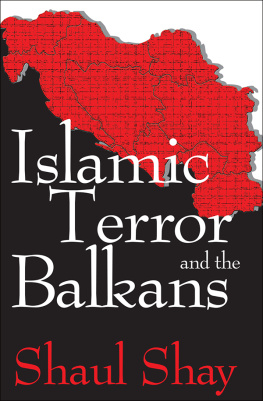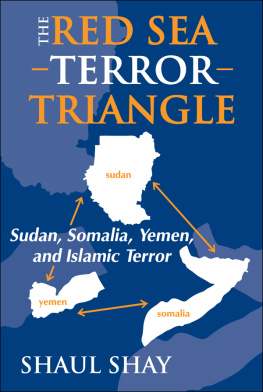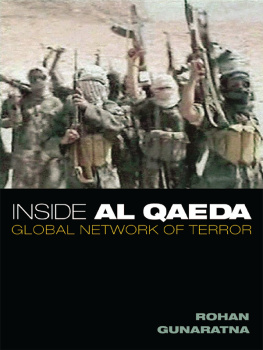First published 2007 by Transaction Publishers
Published 2017 by Routledge
2 Park Square, Milton Park, Abingdon, Oxon OX14 4RN
711 Third Avenue, New York, NY 10017, USA
Routledge is an imprint of the Taylor & Francis Group, an informa business
Copyright 2007 by The Interdisciplinary Center Herzilya Projects.
All rights reserved. No part of this book may be reprinted or reproduced or utilised in any form or by any electronic, mechanical, or other means, now known or hereafter invented, including photocopying and recording, or in any information storage or retrieval system, without permission in writing from the publishers.
Notice:
Product or corporate names may be trademarks or registered trademarks, and are used only for identification and explanation without intent to infringe.
Library of Congress Catalog Number: 2006040467
Library of Congress Cataloging-in-Publication Data
Shay, Shaul.
Islamic terror and the Balkans / Shaul Shay.
p. cm.
Includes bibliographical references.
ISBN 978-0-7658-0347-4 (alk. paper)
1. TerrorismBalkan Peninsula. 2. TerrorismBalkan PeninsulaHistory. 3. TerrorismReligious aspectsIslam. 4. IslamBalkan PeninsulaHistory. 5. Balkan PeninsulaEthnic relations. 6. War on Terrorism 2001- I. Title.
HV6433.B35S43 2006
363.3251209496dc22
2006040467
ISBN 13: 978-1-4128-0868-2 (pbk)
My thanks to Professor Gideon Biger, Dr. Michael Roman, and
Ms. Jennie Lebel for their illuminations and comments which greatly
contributed to the writing of this book.
Since the dissolution of Yugoslavia and the outbreak of ethnic conflicts, the area of the Balkans became a focal point of attraction to Islamic terror entities, particularly for some of the Afghan alumni. In the course of the civil war in Bosnia, the Muslim world rose to the aid of the Muslim minority, and countries like Iran, Libya, and Saudi Arabia sent money, humanitarian aid, and weaponry to the Muslim side, thus circumventing the UN embargo on arms shipments to the fighting parties. In the framework of the mobilization of the Muslim world on behalf of the struggle of the Muslim minority in Bosnia, volunteers arrived in the country, mainly Afghan alumni, and their numbers were estimated at several thousand fighters.
Initially, the volunteers joined the various Bosnian militias that fought the Serbs, but they were quickly incorporated into special units that were established for them (the Mujahidin brigades), with the blessing of Ilia Izetbegovic, leader of the Muslims in Bosnia, who appointed himself their honorary commander.
The Islamic volunteers contribution to the success of the Muslim Bosnians was significant. They helped to boost the morale of the Bosnian fighters, infused them with enthusiasm and a fighting spirit, and deepened their consciousness and Islamic knowledge. The volunteers fought on the various fronts, but also dealt in the training of the Muslim Bosnian fighters. The Mujahidin brigades were active throughout the country and carried out many military campaigns in which their daring and considerable operational skills were demonstrated.
The Islamic volunteers were also involved in many atrocities and cruel acts against the Serb forces and the Serb civilian population, for which three of the Mujahidin brigade commanders are currently being tried in The Hague for crimes against humanity.
In the framework of the mobilization of the Arab world in favor of the Muslims in Bosnia, Bin Ladens men also arrived in Bosnia and established infrastructures for the Al Qaida organization in the Balkans.
In 1994, Bin Laden published an article in response to the ethnic cleansing carried out by the Serbs among the Bosnian Muslims. His article stated the following:
The world has witnessed all this, and not only does it not react to these evil incidents, but it also prevents these helpless people from purchasing the firearms required for their self-protection. All of this is a conspiracy between the United States and its allies, sponsored by the infidel UN.
Bin Ladens claims raise many questions regarding the complex conflict raging in the Balkans, as the United States and the European community both directly and indirectly supported the Muslim side in the confrontation, and they enabled the Muslim side to receive military aid in the form of firearms and fighters by turning a blind eye.
In November 1995, the war in Bosnia ended in the Dayton Agreements and Bosnia-Herzegovina was divided into two political identities, a Croatian Muslim federation with a Muslim majority and a Croatian minority, and the Serb Republic (SRPSKA) with a Serb majority.
At the end of the war, the Bosnian government was required to disarm the Mujahidin brigades and expel them from the country, but the Bosnian government ignored this demand, claiming that Bosnian law makes anyone who fought for the independence of Muslim Bosnia eligible for Bosnian citizenship, and also these fighters are eligible for citizenship due to the moral debt that the Muslim society in Bosnia owed those who came to its aid during wartime.
Thus, Bosnia dismantled the Mujahidin brigades but most of the volunteers remained in Bosnia, established families, and became part of the Muslim Bosnian society. According to estimates, some 1,000 Mujahidin remained in Bosnia and settled in the cities and villages. They also built their own villages, incorporated local supporters, and established autonomous societies governed by the Sharia and strict Islamic lifestyles. Today, Bosnia serves as a focus for the activities of Musim extremists due to the governments weakness, the lack of public security, unenforced law and order, economic backwardness, corrupt public institutions, and extensive infrastructure of organized crime.
These reasons, alongside the existence of border crossing points, most of which are not under any effective government control, turn Bosnia into a convenient focal point for criminal and terrorist activity. For the moment there is no indication of significant terror activity on Bosnian soil, mainly due to the aspiration of extremist Islamic entities to use Bosnia as a haven and safe passage for terror activists.
Following the September 11, 2001 attacks and the U.S. declaration regarding the war on terror, increased pressure was placed on the Bosnian authorities to take action against Islamic terror entities that had found a haven in their country. The United States and Britain have been acting independently (although with the authorities knowledge) to arrest suspected terrorists in the framework of the international peace force stationed in Bosnia. As noted, the involvement of the Islamic terrorist entities in the Balkans has continued after the end of the war in Bosnia, and these entities took an active part in the war in Kosovo in 1999 and, subsequently, in Macedonia as well in 2001.
It would appear that in the course of the last decade, which was characterized by conflict between the Muslims and the Serbs in the Balkan, terror entities succeeded in establishing a firm organizational infrastructure which currently serves these organizations for the purpose of their terror activity in Europe and in other world focal centers, with the Western countries headed by the U.S. experiencing difficulty coping with them.












